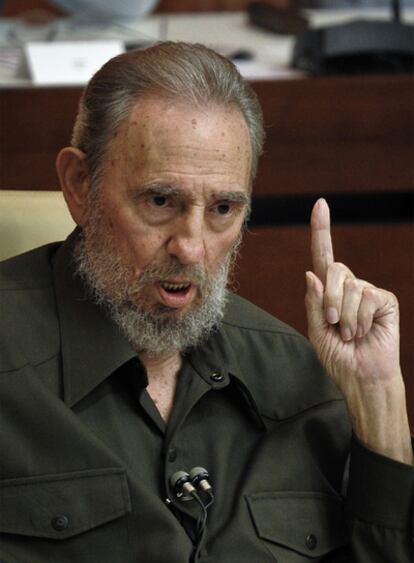Fidel Castro cedes last shred of power
Former Cuban leader won't take on any more roles in Communist party
Fidel Castro announced on Tuesday that he is stepping down from the Cuban Communist Party's central committee, telling delegates at a party congress in Havana that he doesn't want to occupy any more positions. His announcement was made public on the day members voted for new leadership, which will be charged with ushering in sweeping economic changes to the cash-strapped island.
Cuban President Raúl Castro, 75, and Vice President José Ramón Machado Ventura, 80, were given the Communist Party's top two positions in the vote.
Fidel stepped down as Cuba's leader after he became seriously ill in 2006 with diverticulitis.
"Raúl knows that I won't accept any position in the party," Fidel wrote in a column published on the website Cubadebate, one of the publications to which he frequently contributes. He said he made the decision last month, but only confirmed it publicly on Tuesday.
Castro has been secretary general since 1965, the year the Cuban Communist Party was created. He also wrote that he gave his brother a list of names of people who should be excluded as candidates to the Central Committee "because they can't be much service to the party because of their age or health."
"And I added that the most important thing was for me not to be on that list," Castro wrote.
The VI Cuban Communist Party Congress - the first one to be held in 14 years - was called on Saturday to discuss and vote on new economic and political measures. Among the proposals voted on by the delegates were recommendations to the National Assembly to allow Cubans to purchase homes and automobiles for the first time, and put term limits on future leaders.
"I like the idea [of term limits]," wrote Fidel, who himself was in power for 47 years. "It is a subject on which I have long meditated."
During the sessions, delegates debated a host of subjects including the Cuban government's progress in turning over state-owned land to people in rural areas so they can set up private agriculture ventures. So far, the government has given 1.91 million hectares to some 143,000 applicants - this represents about 63 percent of the land that is in state hands.
Other debates ranged from tax and currency reforms to paying for repairs on rice-cookers and other small appliances provided by the state to many residents. Cubans have also demanded that their government get rid of ration books, which Raúl said "have remained with us for too long."
"This distribution mechanism introduced in times of shortages during the 1960s, in the interest of providing equal protection to our people from those involved in speculation and hoarding with a lucrative spirit, has become in the course of the years an intolerable burden to the economy and discouraged work, in addition to eliciting various types of transgressions," Raúl Castro said.
Cuba has been hit hard by a series of setbacks over the past few years, including feeling the effects of the global financial crisis and the destruction of crops after a string of hurricanes struck the island in quick succession.
The final reform package was not due to be made public until later Tuesday after the vote for the party's new leadership. Recommendations will be given to the National Assembly, which is expected to act quickly and approve them in the coming weeks.

Tu suscripción se está usando en otro dispositivo
¿Quieres añadir otro usuario a tu suscripción?
Si continúas leyendo en este dispositivo, no se podrá leer en el otro.
FlechaTu suscripción se está usando en otro dispositivo y solo puedes acceder a EL PAÍS desde un dispositivo a la vez.
Si quieres compartir tu cuenta, cambia tu suscripción a la modalidad Premium, así podrás añadir otro usuario. Cada uno accederá con su propia cuenta de email, lo que os permitirá personalizar vuestra experiencia en EL PAÍS.
¿Tienes una suscripción de empresa? Accede aquí para contratar más cuentas.
En el caso de no saber quién está usando tu cuenta, te recomendamos cambiar tu contraseña aquí.
Si decides continuar compartiendo tu cuenta, este mensaje se mostrará en tu dispositivo y en el de la otra persona que está usando tu cuenta de forma indefinida, afectando a tu experiencia de lectura. Puedes consultar aquí los términos y condiciones de la suscripción digital.








































